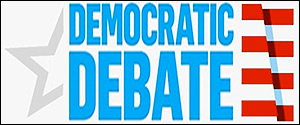By Jim Ellis
 Aug. 16, 2019 — It appears the Democratic National Committee’s move to increase the presidential debate qualifications in order to decrease the number of participants is working.
Aug. 16, 2019 — It appears the Democratic National Committee’s move to increase the presidential debate qualifications in order to decrease the number of participants is working.
With the first two debates featuring 20 candidates over a two-night process, party leaders obviously wanted to cull the field in order to attract a large viewership and host a more serious single forum. Thus, the debate qualifications were doubled in order to ensure that only the most competitive candidates would be included in the succeeding candidate events.
Originally, in order to earn a debate podium, the contenders had to recruit 65,000 donors or score at least one percent support within a series of designated polls. For the third debate scheduled over two days — Sept. 12-13 from Houston — the minimum qualification standards were doubled. Now, the candidates must prove they have at least 130,000 donors, 400 of whom come from at least 20 states, and receive two percent support on four of eight designated polls during the period of June 28 and Aug. 28.
At this point, nine candidates have already officially qualified for the September forum and three more have clinched one of the two platforms. Most of the nine were expected to earn their debate positions, but there is at least one major surprise, and some believe two minor ones.
| The next debate will feature no fewer than the following candidates (alphabetically listed): |
|---|
| • Former Vice President Joe Biden |
| • Sen. Cory Booker (NJ) |
| • Mayor Pete Buttigieg |
| • Sen. Kamala Harris (CA) |
| • Sen. Amy Klobuchar (MN) |
| • Ex-Rep. Beto O’Rourke (TX) |
| • Sen. Bernie Sanders (VT) |
| • Sen. Elizabeth Warren (MA) |
| • Businessman Andrew Yang |
Yang qualifying so early is the obvious major surprise, and there was original controversy surrounding an earlier decision not to count one of the polls that placed him above two percent. Though easily attaining the donor benchmark, he appeared to have also met the polling standard. But the DNC ruled that a candidate could not include two polls from the same source, in this instance NBC News, even though they are different surveys. However, Yang rebounded and still managed to qualify even under the more stringent polling standard.
Sen. Booker is a minor surprise largely because he was originally complaining about the new standards, saying that the donor benchmark was too high, particularly for a candidate with heavy minority support. But he, too, has overcome the objections and earned his podium early in the process. Sen. Klobuchar looked to have a difficult time with both platforms but has responded positively in fundraising and polling resulting in her booking her position far ahead of schedule.
For a time, it appeared that O’Rourke, who would easily qualify on the fundraising platform, would have trouble with the polling sector. That proved not to be the case, however, as he, too, met both benchmarks early in the qualifying period.
The three who are on the bubble are former Housing and Urban Development Secretary Julian Castro, Rep. Tulsi Gabbard (D-HI), and billionaire Tom Steyer, a late entry into the presidential sweepstakes. All have qualified financially, but not in polling. Castro has the best chance of making it from this group of three because he needs only one more poll to clinch a podium. Both Gabbard and Steyer need three more apiece in the remaining two weeks.
If all three of the latter group secure their individual slots, it is likely the committee will be forced into another two-night presentation. With 10 or less, the forum will probably be confined to one night.
Narrowing down the field also virtually guarantees that all of the major candidates will be facing each other as a group on the same stage for the first time. Therefore, the upcoming Houston forum is likely to provide viewers with a more in-depth look at the major candidates and quite possibly some of their more controversial issue positions.
